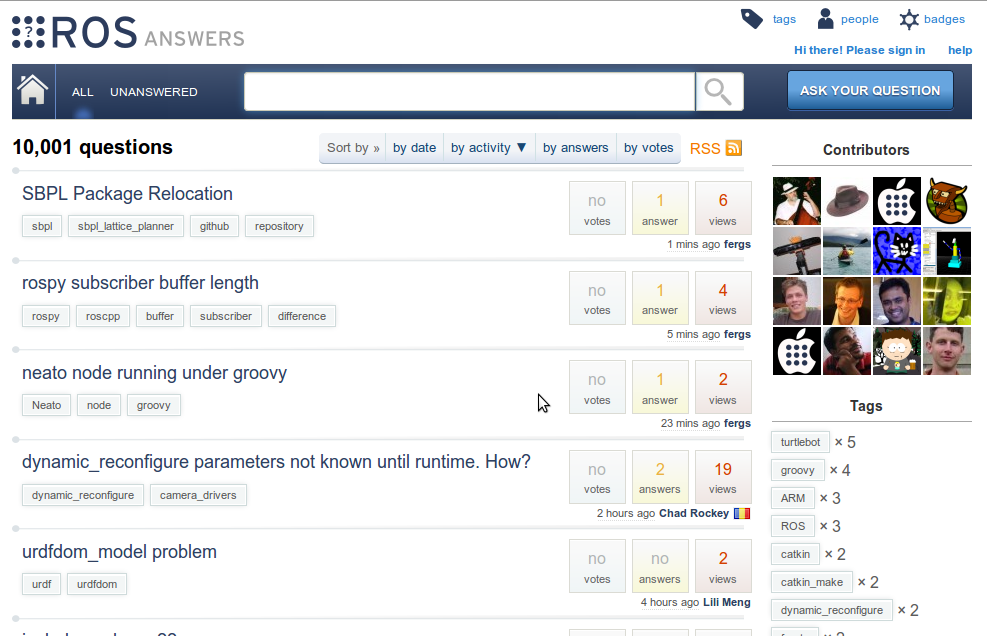From ros-users@
Hi Everyone,
This email is to give an update on the ROS Hydro development.
In perparation for Hydro there has been lots of activity preparing the infrastructure for the new release [1]. There also has been significant patch releases for Groovy happening [4]. Two major requirements for the Hydro fork were the upgrades to bloom and the development of a REP for 3rdparty package releases which are being finished up [5] [6].
= Updated Hydro Schedule =
As we are now ready to fork the rosdisto for Hydro development we need to review the Hydro development cycle. We will not be able to catch up to the standard release cycle.
New Schedule Goals:
- March 5th: Hydro Fork
- April 2nd: Hydro Alpha
The first version of all packages are released into Hydro.
- April 25th: Hydro Beta
All major changes have been completed for stable packages.
- May 22nd: Hydro Medusa Release
This means that in the next 4 weeks we hope that all released packages can be released into Hydro to form the Alpha Release on April 2nd. There will be 3 more weeks for upgrades before the Beta release on April 25th.
If you are a maintainer please watch for when it will be appropriate to make your first release into Hydro.
= Ongoing REPs =
Already there has been quite a bit of activity developing REPs for the Hydro cycle with discussions ongoing for REPs in ros-users, ros-sig-drivers, and ros-sig-buildsystem and the pull requests in the rep repository [3]. I encourage everyone to watch for REP discussions and consider joining them.
The REPs under review can be found at these locations:
- 132 Incorporation of Changelogs into Package Source Tree https://github.com/ros-infrastructure/rep/blob/master/rep-0132.rst
- 133 Separation of build environment and source tree tools https://github.com/tkruse/rep/tree/repwstool
- 134 catkin_make_isolated for non-standard catkin packages https://github.com/tkruse/rep/blob/repisolated/rep-0134.rst
- 135 Driver Namespace Practices https://github.com/chadrockey/rep/blob/namespace/rep-0135.rst
- 136 Releasing Third Party, Non catkin Packages https://github.com/ros-infrastructure/rep/blob/release_third_party/rep-0136.rst
- 137 ROS distribution files https://github.com/po1/rep/blob/rep137/rep-0137.rst
- 138 LaserScan Common Topics, Parameters, and Diagnostic Keys https://github.com/chadrockey/rep/blob/laserscanner/rep-0138.rst
They all have pull requests pointing to their discussions at [3].
= Outstanding Issues =
One major change in Ubuntu which will effect Hydro is that In Raring Ringtail (13.04) Ubuntu will switch to use Python 3 by default. This will require a large audit of the Python codebase to test for compatability. There's an issue open to keep track of this at the rosdistro level [7]. We plan to follow Ubuntu's recommendation which is to make scripts Python 2.7+ and Python 3.3+ compatible. For more information on what is required see the Ubuntu Python 3 wiki page [8].
= Maintainer Status =
One of the initiatives we plan for Hydro is to keep more up to date maintainer information for packages. This is covered in draft REP 137 [2]. There are a large number of released packages which over time the original authors have moved to new situations where they do not have the ability to maintain their packages. Historically many of these packages were picked up and carried forward by a few individuals. However this approach is not sustainable.
To keep the quality of ROS packages as high as possible we will be looking for new maintainers to distribute the burdon throughout the community. We will ask that all packages released into Hydro have clear maintenance status.








 ----->
-----> 
 -->
--> 